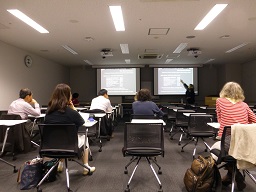講師:ヴィクトリア・デ・グラツィア(Victoria de Grazia) (米国 コロンビア大学教授)
広島平和研究所では、下記のとおりHPI研究フォーラムを開催しました。


1. テーマ
「あるファシストの心―イタリア支配下キレナイカのテルッツィ 1927年・29年・31年」
2. 日時
2018年10月3日(水)18:00-20:00
3. 場所
広島市立大学サテライトキャンパス セミナールーム2
広島市中区大手町4-1-1 大手町平和ビル9階 (市役所本庁向い)
4. 講義の概要
『柔らかいファシズム』(有斐閣、1989年)で知られるファシズム研究者、ヴィクトリア・デ・グラツィア氏が、1920年代から30年代にかけてファシスト政権下のイタリアがキレナイカ(リビア)で行った大量殺戮と、これに関与したファシスト党幹部で、のちに国防義勇軍司令官(1929-35年)、イタリア・アフリカ大臣(1939-43年)を務めたアッティリオ・テルッツィを取り上げ、当時のヴェルサイユ体制を基盤とした西欧国際秩序の枠組みのなかで、イタリアのファシスト政権がなぜ、そしてどのようにして残虐なジェノサイドを行っていったのか、振り返ります。また、グラツィア氏の報告を踏まえ、イタリアだけでなく広くファシズムやジェノサイドについて議論する予定です。
5. ヴィクトリア・デ・グラツィア 氏の略歴
ヴィクトリア・デ・グラツィア氏は、フィレンツェ大学スミス・カレッジ(伊国)で学んだ後、コロンビア大学にて博士号(歴史学)を取得。ニュージャージー州ラトガーズ大学で教鞭を執った後、1994年コロンビア大学に着任。現職は、同大学ムーアカレッジ歴史学教授。主たる研究分野は現代史で、ジェンダー的視点からの西欧・イタリア研究に加え、商業革命に関するグローバルな視点を発展させることに長期にわたり従事している。現在は、イタリアのファシストにおける親密性と権力に関する著作を執筆中。主な著作はIrresistible Empire: America’s Advance Through Twentieth Century Europe (Belknap Press, 2005)、The Sex of Things: Gender and Consumption in Historical Perspective (ed.,University of California Press, 1996)、How Fascism Ruled Women: Italy, 1922-1945 (University of California Press, 1992)など。
HPI Research Forum on October 3, 2018
〝The Heart of a Fascist: Teruzzi in Italian Cyrenaica, 1927-1929-1931″
By Victoria de Grazia, Moore Collegiate Professor of History, Columbia University
The Hiroshima Peace Institute held an HPI Research Forum as follows:
1. Topic “The Heart of a Fascist: Teruzzi in Italian Cyrenaica, 1927-1929-1931”
2. Date & Time:
October 3, 2018, Wednesday, 18:00-20:00
3. Venue
Seminar Room 2, Satellite Campus, Hiroshima City University
4-1-1 Otemachi, Naka-ku, Hiroshima
4. Abstract of Forum
Attilio Teruzzi, a major fascist hierarch, later Commander of the Black Shirts (1929-1935) and Minister of Italian Africa (1939-1943), was Governor of Italian Cyrenaica (Libya) from 1927 to 1929, and was still a player, at Mussolini’s command, in Cyrenaican affairs in 1929-1931 when General Rodolfo Graziani, his successor, at the direct orders of the Military Chief of Staff, conducted the infamous war against the native rural civilian population of Cyrenaica, hunting down and murdering their leaders, rounding up, concentrating them behind barbed wire in detention camps, and walling in from Egypt the Bedouin peoples of the region. By 1931, Fascist Italy had killed as many as 100,000 of the native Cyrenaicans, destroyed the religious and civic infrastructure built over the previous half-century by the Islamic Sanusiyya, and wiped out the once rich ecology of animal and agricultural stocks.
Teruzzi was an equivocator. He was an old colonial soldier, a Fascist New Man, the civilian Governor, with his Jewish American wife as his helpmate, a builder at Benghazi, a “poet,” he would characterize himself, as well as military commander of this once prosperous area of Libya. He was all of this at the very moment that the Fascist regime was defining how to position itself as the coming great power in the Mediterranean and North Africa vis a vis the Franco-British dominated imperial order.
Here, I use this equivocal figure (the subject of the social-moral history of fascist rule, I am just completing) to probe the fascist-imperialist dynamics of the Il Duce’s command system as they first emerged at the turn of the 1930s.
Nobody yet has given an effective rendering of why the Fascist regime resorted to such an appalling level of violence, starting in 1928, breaking with the codes and laws of the Versailles colonial system (Japan’s invasion of Manchuria comes after), and then having to account for, cover up, and find legitimate arguments for its genocidal politics in the face of international protests, but also adverse Italian national opinion. Teruzzi’s equivocations about Fascist policy time and again testify to that endeavor, to the horrific over-kill—and to the eventual success of both the cover-up and the justifications to normalize Fascistic illegalities within the framework of the Western international order.
5. Profile of Victoria de Grazia
Victoria de Grazia, Moore Collegiate Professor of History, was educated at Smith College, University of Florence, and Columbia University where she received her Ph.D. in history with distinction in 1976. Before joining the Columbia faculty in 1994, she taught at Rutgers University. Her research interests lie in contemporary history, with longstanding commitments to studying western Europe and Italy from a gendered perspective and to developing a global perspective on commercial revolutions. Her publications include: Irresistible Empire: America's Advance Through Twentieth Century Europe (2005); The Sex of Things: Gender and Consumption in Historical Perspective (ed., 1996); How Fascism Ruled Women: Italy, 1922-1945 (1992); The Culture of Consent: Mass Organization of Leisure in Fascist Italy (1981). She is currently writing a book about intimacy and power in Fascist Italy.
